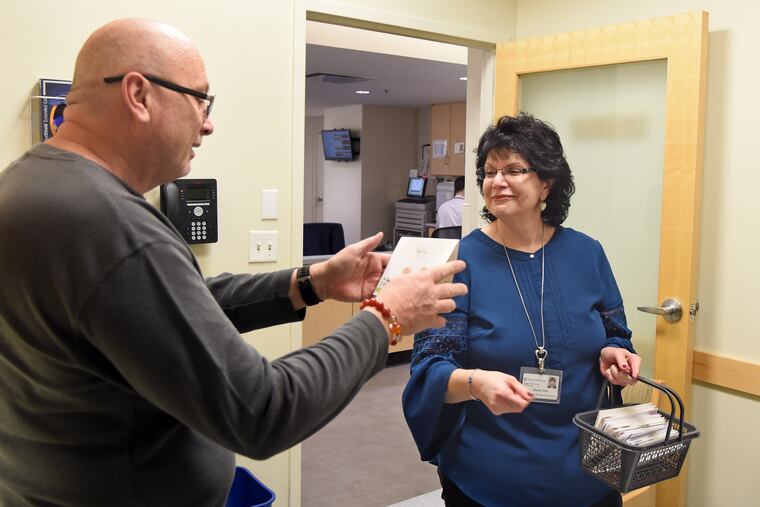She creates 100 get-well cards a month for cancer patients she doesn’t even know
When Sharon Civa had cancer, a stranger's handmade card reassured her that "there are others who believe in you," and "know what it's like." Now, Civa is sharing that belief with others.

Sharon Civa knocked gently on the patient’s door at the chemotherapy infusion floor at the Abramson Cancer Center at the University of Pennsylvania.
“I hear it’s a big day here,” Civa said as she greeted Dolly Gainer, 77, from Lancaster, who was being treated for lung cancer. It was Gainer’s “bell day,” and the Eagles fan couldn’t wait to ring a bell on the wall, which patients clang to celebrate the end of chemo treatment.
Civa, who works for Penn as an information technology officer, remembered her own bell day, five years ago. She had gone to her doctor because she felt tired and full all the time. Her doctor sent her for an ultrasound, and found a mass. It was ovarian cancer.
While she was undergoing chemo, her landscaper submitted her name to a local nonprofit that delivered packages to cancer patients. It came as a surprise on her doorstep — a package of creams, hard candies to deal with the nausea, and a handmade scarf and card.
The card particularly touched her, and she still has it.
“It has flowers on the front, and someone drew some grass, and inside there was a message of having hope and peace and strength, and that there are others who believe in you,” said Civa. “That was what really got me, I thought — whomever wrote this knows what it’s like.”
After she completed treatment and returned to work, she started making cards of her own. She started with the nonprofit that made that first basket, but they closed, so she now works with Penn’s volunteer office.
She starts with blank white cards, and a theme. She never knows who the patients might be, so she makes a variety of styles — sports or cats or flowers. Some of the cards are elaborately decorated with rhinestones and pictures. Others are quite simple.
» READ MORE: Could writing a daily thank-you note transform your life?
Although Civa doesn’t describe herself as “crafty,” the cards are creative, and pretty, and sometimes a little silly. “The path to my heart is paved with paw prints,” reads one. Another had stickers of different sports balls. Once she has an idea, it takes her about 15 minutes to make a card.
Most of the time she pays for the supplies herself, usually about 50 cents a card, but her department at Penn has sponsored a “make a card” event, paying for all the supplies. She has applied for a small grant to make 1,000 cards.
She creates about 100 a month, distributing them to patients on her own, or handing them off to volunteers at other units.
Inside, Civa pens messages of encouragement: “ Follow your dreams,” “Believe in yourself,” “Make what ails you walk the plank!” (that was a pirate themed-card). She signs them, “Hugs, Sharon.”
Recently, she was in the hospital’s ICU with a loved one, and someone with a volunteer cart came by. Civa mentioned that she volunteered as well, and mentioned her cards.
“She said, ‘Are you Sharon? I give out your cards!’” recalled Civa. “It was an amazing moment. Now we keep in touch and she’ll tell me, ‘I gave out 25 of your cards!'”
While Civa is delighted that others are distributing her handiwork (she once saw a post of appreciation on a Facebook group from someone who received one from a volunteer), it’s always a special experience when she gets to hand them out personally. She asks the nurses for suggestions, because not everyone is in the mood for a visit. Then she knocks on the door.
"Hi, I'm Sharon, I'm a volunteer here, and I've had cancer and chemo." That's how she introduces herself, room by room. She asks if people have questions. Sometimes they want to know what side effects she had, and how she handled losing her hair (“I wore hats.”) Sometimes they ask questions she can’t answer and she refers them to their doctor.
» READ MORE: Pediatric surgeon heals patients with art and medicine
Mostly they are just appreciative of a moment of thoughtfulness from someone who has been on the same journey. On a recent Wednesday, people thanked her for being considerate and compassionate.
The card she gave to Dolly Gainer read, “The flower that blooms in adversity is rare and blooms often.”
Gainer held it as she waited for the last 20 minutes of treatment to tick by, when she would at last ring that bell. Her family talked about how the doctors and nurses on the floor had been extremely kind, had made them feel like they could ask any questions, that they were never a burden.
Then Civa moved onto the next room, basket of envelopes in her hand.
“Hi, I’m Sharon, I’m one of the volunteers here,” she said. “I’ve had cancer too, and I’ve been where you are. Would you like a visit?”